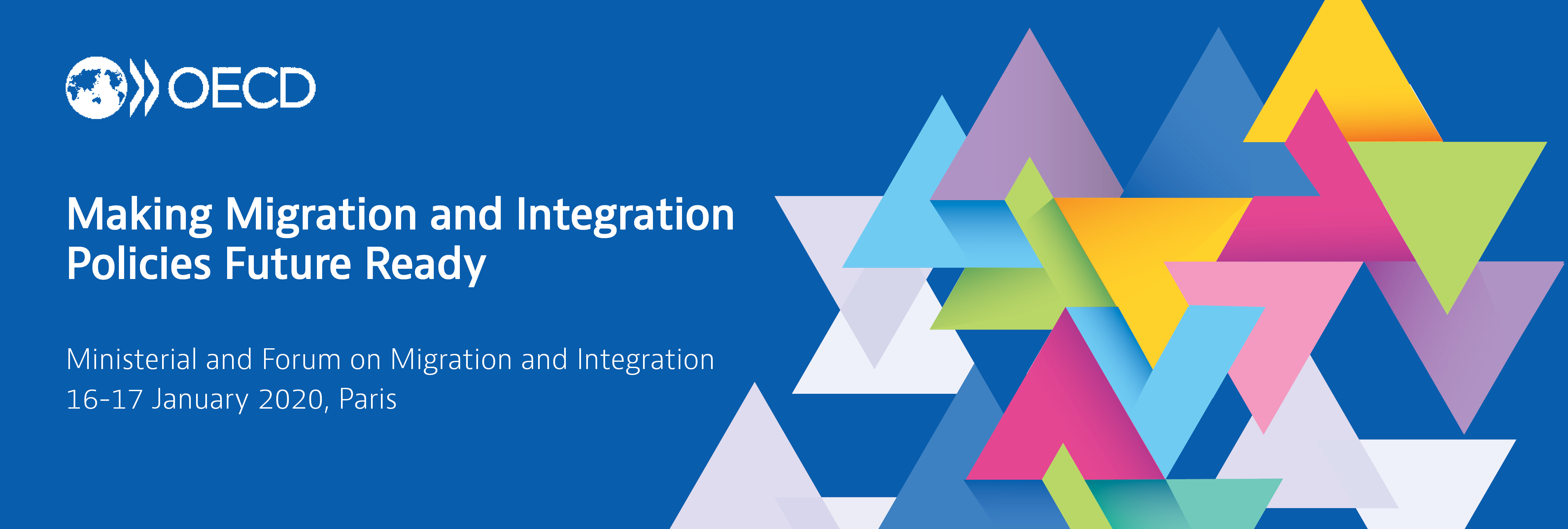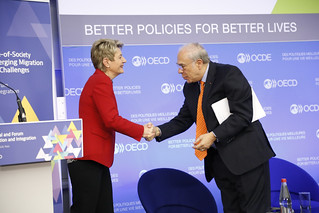High-Level Policy Forum - 16 January 2020
Emerging challenges such as changing labour markets, technological advances, forced displacement and population dynamics make it necessary to invest in the design and implementation of future ready policies based on a whole-of-society approach that involves both the public and private sector. Adapting migration and integration systems to enhance their contribution to economic growth and social cohesion stands as one of the most important policy objectives in the forthcoming years.
Under the title “Building a Whole-of-Society Approach to Emerging Migration and Integration Challenges”, the High-Level Policy Forum provided an opportunity to engage in a conversation about various migration and integration topics with ministers, senior officials and a wide range of stakeholders, including leaders from the business community, academics and representatives from civil society.
Following a call for projects, the Forum gave selected candidates the opportunity to showcase innovative projects on migration and integration.
Watch the live webcast
Key links
- Forum Opening remarks by the Secretary General of the OECD, Angel Gurría
- Forum Opening remarks by the Swiss Federal Councillor, Karin Keller-Sutter
- Forum Closing remarks by OECD Chief of Staff and Sherpa to the G20, Gabriela Ramos
- Sign up for the OECD Migration Newsletter
OECD High-Level Policy Forum: Programme
Building a Whole-of-Society Approach to Emerging Migration and Integration Challenges
Printable versions: Programme (PDF) - Programme FR (PDF)
|
Moderator: Melinda Crane - Chief Correspondent, Deutsche Welle TV |
||
|
Thursday, 16 January 2020 |
||
|
09:30-10:00 |
Welcoming Remarks (CC1) Angel Gurría, OECD Secretary-General Karin Keller-Sutter, Federal Councillor, Chair of the Ministerial, Switzerland |
|
|
10:00-11:00 |
Preparing for the future: lessons from global migration over the past decade (CC1) This introductory panel will discuss the experiences of countries regarding large migration inflows, and the lessons learned moving forward. It will involve high-level representatives from the UN and from selected OECD countries that have - or had - a key role in contexts of dealing with large migration inflows, as well as the president of a leading think tank. Annette Widmann-Mauz - Minister of State and Federal Government Commissioner for Migration, Refugees and Integration, Germany George Koumoutsakos - Alternate Minister for Migration and Asylum, Greece Gillian Triggs - Assistant High Commissioner for Protection, Office of the United Nations High Commissioner for Refugees (UNHCR) Demetrios G. Papademetriou - Distinguished Transatlantic Fellow and President Emeritus, Migration Policy Institute |
|
|
11:00–11:30
|
Elevator pitches for the Innovation Lab (CC1) Following a call for proposals with member countries, 11 selected innovative projects related to migration and integration from across OECD countries were be presented in short, 1-minute “elevator pitches”. Further detailed presentations of these and other selected innovative projects will be made throughout the day in the OECD Conference Centre room CC9. Duo for a Job (Belgium) Responsible AI in immigration decision-making (Canada) Integral Actions (Colombia) Integration Centers (Czech Republic) Serious board game about migration governance (European Union) Virtual Welcome Center (Germany) CONNGI - Coordinamento Nazionale Nuove Generazioni Italiane (Italy) Mana Aki: Building intercultural competence in New Zealand’s public service (New Zealand) Wroclaw on tongues of the world (Poland) Power Coders (Switzerland) Hej Framling! (Sweden) |
|
|
11:30-11:45 |
Coffee Break |
|
|
11:45-13:00 |
Foresight: the future of migration and integration Presentation and discussion in break-out groups of the results of a foresight exercise of the OECD, focusing migration and integration in 2035. The session will be divided in four parallel themes. Each theme will conclude with reactions by two renowned policy makers and experts: (a) The impact of new technologies on migration control and enforcement (CC12) Nina Gregori - Executive Director, European Asylum Support Office (EASO) Ola Henrikson – Director, Regional Office for the EU, Norway and Switzerland, International Organization for Migration (IOM)
(b) The impact of new technologies on integration services delivery (CC13) Cornelia Lüthy - Vice-Director, State Secretariat for Migration (SEM), Federal Department of Justice and Police, Switzerland Agnès Fontana - Director, Reception and Support for Foreigners and Nationality at the Ministry of the Interior, France
(c) The role of regional and local authorities (CC15) Bart Somers - Vice Minister-President, Flemish Government, Belgium Lena Metlege Diab - The Honourable Minister of Immigration, Nova Scotia, Canada
(d) The role of corporations in migration and integration management (CC7) Annemarie Muntz – President, World Employment Confederation and Managing Director, Global Public Affairs, Randstad Anne Duncan – Global Vice-President, International Women's Forum and Managing Director, Lumiu |
|
|
13:00-14:30 |
Lunch Break (Special VIP lunch with keynote speech) Miguel Ángel Moratinos, High Representative for the United Nations Alliance of Civilizations (UNAOC) |
|
| 14:30-15:45
|
Parallel Sessions | |
|
A) Engaging with civil society – new approaches in the integration of migrants (CC12) New and innovative approaches that have been taken throughout OECD countries to leverage civil society in promoting the integration of migrants – notably with respect to social integration. This session will present and discuss some of these. Chair: Mariana Vieira Da Silva – Minister of State for the Presidency, Portugal Kostas Bakoyannis – Mayor of Athens, Greece Lizette Risgaard – President, Danish Trade Union Confederation, Denmark Maria Nyman – Secretary-General, Caritas Europe Keizo Yamawaki – Professor, Meiji University, Tokyo, Japan
|
B) Innovations in Language Training (CC13) This session will present and discuss innovative approaches to language learning – either through new technologies or through innovation in course design and outreach. Chair: Eitvydas Bingelis – Vice-Minister, Ministry of the Social Security and Labour, the Republic of Lithuania Uta Saumweber-Meyer – Director-General for Integration, Federal Office for Migration and Refugees, Germany Sonja Hämäläinen – Director for Migration, Ministry of Economic Affairs and Employment, Finland Ofir Lahav – Deputy Director-General, Policy Planning and Budget, Ministry of Aliyah and Integration, Israel Michel Boiron – Director General, Centre d’Approches Vivantes des Langues et des Médias (CAVILAM), France
|
|
| C) Matching migrants with employment opportunities (CC15) A key issue with which many countries are struggling is to match migrants’ skills with available employment opportunities, notably, but not exclusively, for refugees. This requires skills being assessed upfront and migrants being put in touch with relevant employers. Chair: Fraser Valentine – Assistant Deputy Minister of Settlement and Integration, Immigration, Refugees and Citizenship, Canada Guro Angell Gimse – State Secretary, Ministry of Labour and Social Affairs, Norway Maria Hilda Marsiaj Pinto – National Secretary of Justice, Brazil Petra Draxl – Managing Director of the Public Employment Service Vienna (AMS), Austria Ruth Annus – Director General of Citizenship and Migration Policy Department, Ministry of Interior, Estonia
|
D) Innovation in skills partnerships (CC7) Skills partnerships are an increasingly important tool for matching talent in origin countries with labour needs in destination countries, while avoiding negative impacts on the origin country. This session will discuss some recent policy innovations in this field. Chair: Drahoslav Štefanek – Special Representative on Migration and Refugees, Council of Europe Michael Spindelegger – Director General, International Centre for Migration Policy Development (ICMPD) Leonie Gebers – State Secretary, Federal Ministry of Labour and Social Affairs, Germany José Alarcon Hernández – Director General of Migration, Ministry of Employment, Migration and Social Affairs, Spain Severoni Santino – Special Advisor on Migration and Health, WHO Office for Europe |
|
| 15:45-16:00 | Coffee Break | |
| 16:00–16:30 |
A conversation on the global competition for talent (CC1) This session will bring together high-level representatives from emerging and destination economies to discuss the global competition for talent. XU Ganlu – Vice-Minister of Public Security and Head of National Immigration Administration, China Gordan Grlić Radman – Minister of Foreign and European Affairs of the Republic of Croatia, on behalf of the Croatian Presidency of the European Union |
|
| 16:30-17:45 |
Ministerial panel: A whole-of-society response to future migration and integration challenges (CC1) This high-level closing session will act as a bridge between the policy forum and the ministerial meeting on the following day and will involve a selection of Ministers. Ylva Johannsson – Home Affairs Commissioner, European Commission José Luis Escrivá – Minister of Social Security, Inclusion, and Migration, Spain Eva Nordmark – Minister of Employment, Sweden Catrina Tapley – Deputy Minister of Immigration, Refugees and Citizenship, Canada Natalia Álvarez – Deputy Minister of Employment and Social Welfare, Costa Rica |
|
| 17:45-18:00 |
Concluding remarks (CC1) Gabriela Ramos - OECD Chief of Staff and Sherpa to the G20 |
|
| 18:00 |
Cocktail for all participants hosted by Spain and Chile (Salon du Parc) |
|


